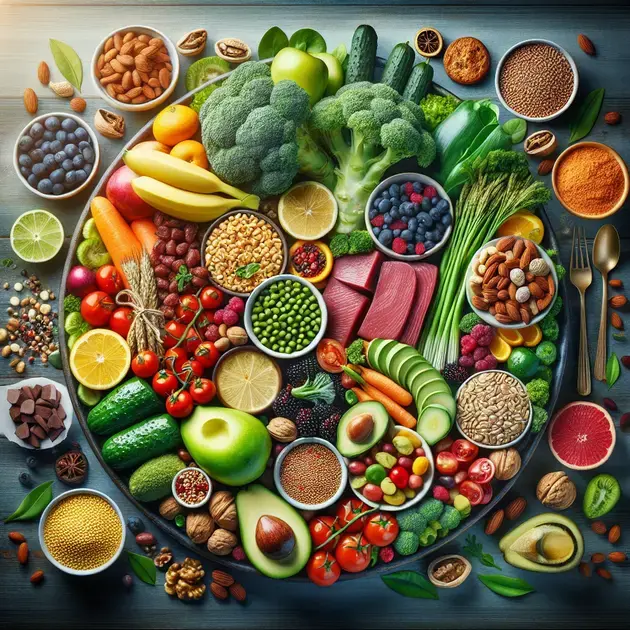When it comes to achieving effective weight loss, one of the key factors to consider is optimizing calorie intake. By carefully managing the number of calories consumed on a daily basis, individuals can create a calorie deficit that is essential for shedding unwanted pounds.
Recent studies have shown that the quality of calories consumed is just as important as the quantity. In addition to focusing on the number of calories, paying attention to macronutrients and micronutrients can make a significant impact on overall weight loss progress. This holistic approach to optimizing calorie intake can lead to sustainable and long-lasting results.

Understanding Caloric Needs for Weight Loss Success
To achieve weight loss success, it is crucial to understand your caloric needs. Caloric needs vary from person to person based on factors such as age, gender, weight, height, and activity level. One way to determine your caloric needs is by using a calorie calculator, such as the one found on the website of the National Institute of Diabetes and Digestive and Kidney Diseases (NIDDK).
Once you have calculated your caloric needs, the next step is to create a caloric deficit. This means consuming fewer calories than your body burns, resulting in weight loss. To track your calorie intake and ensure you are in a deficit, you can use apps like MyFitnessPal or Lose It!, which provide tools to log your meals and monitor your progress.
In addition to monitoring your caloric intake, it is essential to focus on the quality of the calories you consume. Opt for nutrient-dense foods that provide essential vitamins and minerals while limiting empty calories from foods high in added sugars and unhealthy fats. Websites like ChooseMyPlate.gov offer valuable resources and information on building a healthy eating plan.
Understanding your caloric needs is the first step towards achieving weight loss success. By utilizing tools like calorie calculators and tracking apps, along with focusing on nutrient-dense foods, you can create a sustainable plan for reaching your weight loss goals.
Importance of Quality Calories in Your Diet
When it comes to weight loss, the quality of the calories you consume is just as important as the quantity. Quality calories come from whole, minimally processed foods that are rich in nutrients and beneficial for overall health. Websites like Eat Right, run by the Academy of Nutrition and Dietetics, offer guidance on incorporating quality calories into your diet.
One way to prioritize quality calories is by focusing on whole grains, lean proteins, fruits, vegetables, and healthy fats. These foods not only provide essential nutrients but also keep you feeling full and satisfied, making it easier to stick to your weight loss plan. Apps like Fooducate can help you identify the nutritional value of foods and make informed choices while grocery shopping.
Avoiding empty calories from sugary beverages, fast food, and processed snacks is key to optimizing your weight loss efforts. By replacing these items with nutrient-dense alternatives, you can improve your overall health and well-being while working towards your weight loss goals.
By understanding the importance of quality calories and making conscious choices about the foods you eat, you can support your weight loss journey and enhance the effectiveness of your caloric intake.
Achieving Sustainable Weight Loss Through Calorie Optimization
Calorie optimization plays a significant role in achieving sustainable weight loss. By striking the right balance between calories consumed and calories burned, you can create a long-term plan for managing your weight. Websites like the Center for Nutrition Studies offer insights into optimizing your caloric intake for weight loss success.
One effective strategy for calorie optimization is meal planning. By preparing nutritious meals in advance, you can control portion sizes and ensure you are meeting your caloric goals. Apps like Mealime provide customizable meal plans and recipes tailored to your dietary needs, making it easier to stay on track with your weight loss journey.
Incorporating physical activity into your routine is another essential aspect of calorie optimization. By engaging in regular exercise, you can increase your caloric expenditure and support weight loss efforts. Fitness apps like Nike Training Club or MyFitnessPal can help you track your workouts and stay motivated on your fitness journey.
Consistency is key when it comes to achieving sustainable weight loss through calorie optimization. By making gradual changes to your diet and lifestyle, tracking your progress, and staying committed to your goals, you can establish healthy habits that support long-lasting weight management.

Effective Strategies for Monitoring Caloric Intake
Keeping track of caloric intake is crucial for anyone looking to manage their weight effectively. There are several strategies you can implement to monitor your caloric intake successfully.
1. Keep a Food Journal
One of the most effective ways to monitor caloric intake is by keeping a food journal. Write down everything you eat and drink throughout the day, including portion sizes. This will help you become more aware of your eating habits and make smarter choices.
2. Use a Tracking App
There are many mobile apps available that can help you track your caloric intake easily. These apps often have large databases of foods and their nutritional information, making it simple to log your meals and snacks accurately.
3. Measure Your Food
Invest in a kitchen scale and measuring cups to ensure you are accurately portioning your food. Eyeballing serving sizes can lead to inaccuracies in tracking your caloric intake, so measuring your food is key.
4. Be Mindful of Hidden Calories
Many foods, especially processed ones, contain hidden calories that can add up quickly. Be mindful of condiments, drinks, and cooking oils, as they can contribute significant calories to your daily intake without you even realizing it.
5. Plan Your Meals Ahead
Planning your meals ahead of time can help you stay within your caloric goals. Preparing meals in advance allows you to control portion sizes and make healthier choices, reducing the risk of overeating.
Balancing Macronutrients for Optimal Weight Loss Results
Optimizing your macronutrient intake is essential for achieving optimal weight loss results. Balancing carbohydrates, proteins, and fats can help you maintain a healthy diet and support your weight loss goals.
1. Focus on Whole Foods
Choosing whole, unprocessed foods is a great way to ensure you are getting a good balance of macronutrients. Fruits, vegetables, lean proteins, whole grains, and healthy fats should form the basis of your diet.
2. Calculate Your Macronutrient Ratios
Depending on your weight loss goals and activity level, you may need to adjust your macronutrient ratios. Consulting with a nutritionist or using online calculators can help you determine the right balance of carbs, proteins, and fats for your needs.
3. Don’t Neglect Any Macronutrient
All three macronutrients play important roles in the body, so it’s crucial not to neglect any of them. Carbs provide energy, proteins support muscle growth and repair, and fats are essential for hormone production and nutrient absorption.
4. Eat Regularly Throughout the Day
Splitting your meals into smaller, balanced portions throughout the day can help you maintain steady energy levels and prevent overeating. Aim to include a source of each macronutrient in every meal and snack.
5. Adjust Based on Progress
Monitor your weight loss progress and adjust your macronutrient intake accordingly. If you hit a plateau, you may need to tweak your ratios to continue seeing results. Consistency and experimentation are key.
Maximizing Metabolism Through Smart Calorie Consumption
Boosting your metabolism can help you burn more calories throughout the day, supporting your weight loss efforts. Smart calorie consumption plays a significant role in maximizing your metabolism.
1. Prioritize Protein-Rich Foods
Protein requires more energy to digest compared to carbs and fats, making it a thermogenic food that can boost your metabolism. Include lean proteins such as chicken, fish, tofu, and legumes in your diet.
2. Stay Hydrated
Water is essential for metabolic processes in the body. Dehydration can slow down your metabolism, so aim to drink an adequate amount of water throughout the day. Additionally, opting for cold water can slightly increase calorie expenditure.
3. Incorporate Strength Training
Building muscle through strength training can increase your resting metabolic rate, helping you burn more calories even at rest. Include weightlifting or bodyweight exercises in your fitness routine to boost your metabolism.
4. Don’t Skip Meals
Eating regularly and not skipping meals is important for maintaining a healthy metabolism. When you skip meals, your body may go into starvation mode, slowing down its metabolic processes to conserve energy.
5. Get Sufficient Sleep
Quality sleep is crucial for a healthy metabolism. Lack of sleep can disrupt hormonal balance, leading to increased hunger and cravings. Aim for 7-9 hours of quality sleep per night to support optimal metabolic function.
Conclusion
In conclusion, effective strategies for monitoring caloric intake are essential for weight management. By keeping a food journal, using tracking apps, measuring food, being mindful of hidden calories, and planning meals ahead, individuals can successfully monitor and control their caloric intake, leading to better eating habits and choices.
Moreover,
When it comes to balancing macronutrients for optimal weight loss results, focusing on whole foods, calculating macronutrient ratios based on individual needs, not neglecting any macronutrient, eating regularly throughout the day, and adjusting based on progress are key factors. These strategies can help individuals achieve their weight loss goals effectively and sustainably.
Additionally,
Maximizing metabolism through smart calorie consumption by prioritizing protein-rich foods, staying hydrated, incorporating strength training, not skipping meals, and ensuring sufficient sleep are vital for enhancing metabolic functions. These practices can boost calorie burning, support weight loss efforts, and promote overall health and well-being.